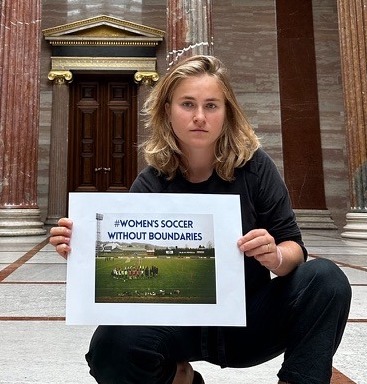

(Stefan Bartl) Hallo Lara, schön, dass du in unser Büro gekommen bist.
(Lara Krampf) Hello Stefan.
We're working with you and Jasmine Sommer on the Focus: Women in Footballproject to put the spotlight on women's football. Could you introduce yourself and tell us how you got involved in football?
(L) Yeah sure, I'm 23 years old, I live in Vienna and I love playing football. I've always been very sporty and I discovered football when I was eight since then I've played for ASV 13, Altera Porta, Wiener Sportclub and now I play for Dynama Donau . In my day-to-day life, I'm learning the Grinberg--Methode und bin froh, heute hier zu sein.*
(S) We have launched a campaign “Focus: Women in Football” in part to highlight the inequalities and injustices that still exist in women's football. Why do you think the sport does not have the status it deserves?
(L) I believe that there are clear reasons for this disparity, which can be attributed to the pervasive influence of patriarchy on our society. It is evident that women's football receives significantly less media coverage and attention compared to men's football. Looking at the attendance figures in stadiums on weekends, it is clear that there is less attention and awareness of how cool and exciting women's football is. Financial and other support are also lacking for women's football. Unfortunately, many women still don't even have the opportunity to play. It is worth noting that women often face a financial barrier when it comes to playing football in a club, which is not the case for men who may even earn money. This can shape our perception of women's football. Girls don't have an easy start in football as it is a relatively niche sport. Opportunities for them to make a career out of it are limited. All in all, there are still several aspects that make it problematic and cause women's football to lag behind men's game.
(S) Do young girls and adolescent women lack role models in sports, especially considering the scarcity of female coaches and athletes in general? How can we address this issue and increase the number of female coaches in football?
(L) Raising awareness that football is a cool sport is a crucial starting point. In classic children's books that are still being sold and produced, girls are never portrayed as footballers or other athletes. Instead, they are often still depicted as cooking, baking, or flying around with sweets as fairies. I think the problem starts with representation in childhood when football is often portrayed as a masculine activity and the focus is on male players like Ronaldo, Neymar, Messi and Mbappe. And it continues into adolescence. Unfortunately, female footballers such as Mapi León, Alex Morgan, and Laura Feiersinger are not given the same level of attention. Despite their impressive skills, they are rarely mentioned in the media, and when they are, it is often in a brief article buried in the back pages of a newspaper. I believe that clubs are often male-dominated, and unfortunately, some men can exhibit toxic, unpleasant, and sexist behavior. This can make it unappealing for women to work in these environments and advance their careers. Similarly, female referees may still face challenges in a male-dominated field. It can be very discouraging to be the only woman in a room full of male referees during training. The problem is currently deadlocked and requires additional financial resources and attention. “Focus: Women in Football" is a great opportunity to provide the necessary push.
(S) Thanks we are very excited about this campaign too. Regarding sexism, I recall a situation about half a year ago involving the Spanish federation and a kissing scandal . What was your opinion on this whole situation?
(L) It was extremely frustrating that Spain won the World Cup and played a fantastic game and yet the media focused on the offensive behaviour of one individual. Although it was disheartening that it happened in front of a global audience, I think it was ultimately positive. It was important to show that such behaviour is unacceptable and has consequences, which ultimately led to the association sacking him (note: Luis Rubiales) These things often happen behind the scenes and it is only in situations like this that they come to light. I also read an interview about the incident afterwards. It seems that he was also harassing the players in the dressing room. It was not the first time he had behaved in this way and they had to put up with it because they needed his support. The coach also tolerated it to a certain extent. So it is important that this issue has come to light.
(S) Many women's teams are struggling to keep playing due to a lack of funding and sponsorship. Why is it that men's teams now receive more funding than women's teams?
(L) I've spoken to club managers about this issue because I find it incomprehensible. If you make a direct comparison, sometimes the women's teams in a club can be even better than the men's teams, which means they are higher up in the leagues. But at the end of the day, it's a question of income, of course, because the men simply have more spectators and get more sponsorship. It's often a question of deciding where to put more money, and once you've got a bit of money coming in, you have to make some tough decisions, and that often leads to women's football being left behind. As long as that is the case, women's football will always be left behind and never go as far as possible. Well, only in terms of attention and spectatorship, not the quality of football. It seems to me that women can get very far without money, and I also think that the amount of money that goes into men's football has reached an absurd level.

(S) On the subject of visibility, and a little comparison between countries, the Austrian national team played in England, in Wembley Stadium, in front of 70.000 spectators at Wembley Stadium, and then they played the return match in Wiener Neustadt, in front of 2,000 people. Why is the interest so low still in Austria? Why is women’s team still not playing at the Ernst Happel Stadium?
(L) Phew, to be honest I can't say. I was at Wiener Neustadt for this game and I think it's embarassing for the national team to play in front of such a small audience at an international level. It's an absolute disrespect and it just shouldn't go on like this. This stadium is also quite inaccessible, you need about 20 or 30 minutes from the station, with irregular bus services. Often, one has to take a taxi or drive there, which can be tedious. Hence it’s logical that few people come to watch, and meanwhile, infrastructure in Vienna is there, it should just be used. It's a question of prioritising, and Austrian football is clearly still lagging behind in this respect, we need more awareness and more drive. Another significant issue is the lack of women in management positions. As a man, one may not have experienced inequality in their career, resulting in less understanding, awareness, and drive to change the status quo. It would be beneficial if the ÖFB actually took a look at what is going wrong and analysed the reasons behind the lack of spectators in women's football, particularly at international matches. They could consider engaging with younger people to explore potential solutions. Opening up a dialogue could be a positive step, as there are many talented and motivated young female footballers. Unfortunately, I am not aware of how they achieved this in England. However, it is very obvious that they made significant progress in women's football in recent years., driven by the influx of energy and money into the sport.
(S) Let's address the darker side of women's football. Did you have any stories of sexism or machismo during your playing career?
(L) Yes, quite a few stories, really. I played for ASV 13 until I was 14. Then, I was poached by Altera Porta and played in the 2nd Bundesliga. It was an all-women's club with a great structure, and I felt comfortable there. Later, I wanted to develop further and joined Wiener Sport-Club. I have heard real stories from other clubs in Vienna, where a coach went to court for sexually abusive behavior towards women. I have also heard stories that suggest this behaviour is not uncommon in women's football, with girls being subjected to it repeatedly. It is disheartening that such situations are considered normal and are not questioned or disputed. I have also experienced instances where men or coaches take up an excessive amount of space and seek attention from women. It is important to address and challenge such behaviour. These actions can create uncomfortable situations. That’s why I am delighted to be a part of Dynamo Donau, a self-organised club with a supportive coach, we even occasionally have female players lead training sessions. Although we face challenges due to our self-organised structure, we aspire to have female coaches or individuals who are knowledgeable about sexism and discrimination.
(S) Are there any female coaches, officials, or clubs setting a good example? You mentioned Dynamo Donau as an example. What is the coach doing differently to others who have not yet experienced this change of heart? How can older coaches learn from this coach?
(L) I believe it is important to be aware of one's own behaviour and reflect on any negative or unhealthy actions towards players. It is crucial to remain respectful, even in emotionally charged situations, and maintain a calm mindset. It is also important to be aware of one's power and position and act accordingly. There are free awareness training courses and workshops on sexism and discrimination offered by 100% Sport . These resources can help individuals take action against discrimination. Additionally, there are places that facilitate self-reflection and awareness of one's behaviour. Developing willingness and sensitivity is key. It is important to note that coaching women should not be limited to men. I believe it is crucial to address the lack of female coaches in the industry. Existing coaches should acknowledge their position and learn from the insights of women in their teams. It is also important to move away from unhealthy power structures within clubs by distributing responsibilities and avoiding centralisation of power.
(S) That would be a good topic for a coaching course, introducing gender competence in a certain direction. It may not be relevant for youth coaches at present, but it could be useful for higher levels. What do you think?
(L) I think, it makes sense to educate even youth coaches because kids learn a lot. They are like sponges, soaking up everything and developing every day. Just look at how quickly children grow and how many development steps they take in a day. Proper gendering boosts people's self-confidence and prevents them from feeling like they don't belong or aren't integrated.
(S) Let's come to the end. If a fairy could give you a magic wand and you could instantly change three things about women's football, what would they be?
(L) I would like to provide all women's teams with the necessary equipment and training facilities that suit all players, giving them a sense of belonging and inclusivity. So firstly, improve resources. Secondly, I would like to have friendly coaches who are competent and non-discriminatory, and who use gender-neutral language. Thirdly, it is crucial for women's football to be inclusive of all individuals on the gender spectrum and to have uniform rules. In Germany, for instance, trans individuals can play without any issues and are not discriminated against based on their gender identity. The focus should be on playing football, a beautiful sport, and not on one's gender identity. This would be my third wish.